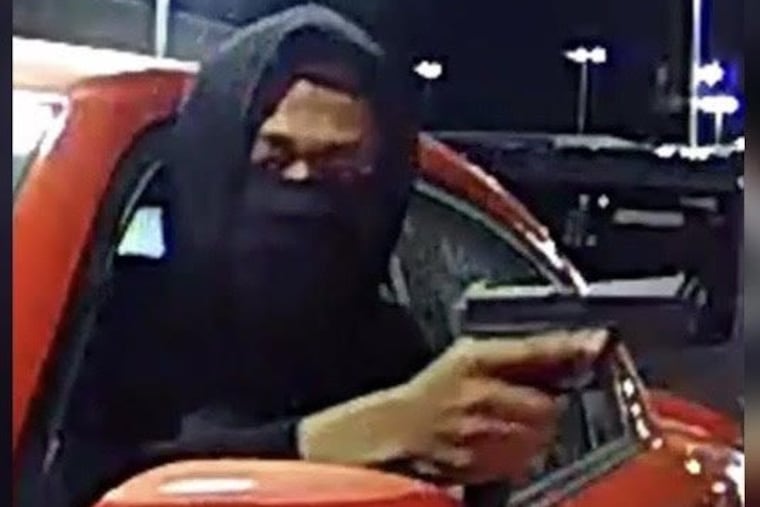SEPTA and stores are banning ski masks. But will that have any effect on crime?
I doubt the Kingsessing shooter would have skipped the ski mask if a citywide ban had been in place. So even if a ban makes people feel safer, it probably won't reduce crime.

Something needs to be done about bad actors who wear black ski masks — also known as balaclavas or Shiestys, inspired by rapper Pooh Shiesty — to conceal their identities.
On Monday night, a shooter wearing a ski mask and body armor and wielding an AR-15-style assault rifle killed five people in Kingsessing.
This is hardly the first crime perpetrated by a person in a ski mask. It’s a thing these days. Take what happened in May, after someone wearing one stepped onto a SEPTA train in West Philly. At first, passenger Maurice Thomas didn’t think much about it, as he is used to seeing people walking around in them. But Thomas, who is also known as Fresh the Legend, watched as the man in the mask got into a heated exchange with a teenager, later identified as 14-year-old Wort Whipple. It ended when the man in the mask shot Whipple, killing him, then ran off the train when the doors opened.
“They’ll never find him because his face was covered,” Thomas told me. “That’s probably why he had so much confidence in shooting [Whipple] like that.”
» READ MORE: Philadelphia is a dangerous place for Black men. Just ask Wort Whipple. | Jenice Armstrong
Days later, SEPTA took the bold move of banning ski masks on all of its trains, platforms, and buses, citing multiple similar incidents like what happened to Whipple. Then on June 15, Councilmember Anthony Phillips introduced legislation that would also ban them on some public property, which includes schools, parks, recreation centers, day-care facilities, and city-owned buildings. The bill was cosponsored by 10 other councilmembers but tabled while lawmakers are on summer break.
“This is an issue that I wanted to take on as soon as possible,” Phillips told me. “There were residents who were complaining to me about how they didn’t feel safe because of these ski masks, and a number of residents came up to me and said, ‘This is something that is terrifying me, and I just want the city to do something about it.’”
I got a sense of just how strongly people feel about this issue earlier this year when I was in North Philly trying to talk to people about the then-upcoming Democratic mayoral primary. But as I made my way along Broad Street, I found that many didn’t want to talk about the candidates — they wanted to talk about gun violence and how ski masks should be banned.
Some stores in certain neighborhoods have signs prohibiting people from entering their premises with their faces covered. If you go on the Philadelphia Police Department’s Facebook page, you can’t help but notice how many of the robbery and other suspects caught on surveillance video are wearing ski masks.
Clearly, there is a lot of support for a ski mask ban. “If I see a guy with a Shiesty, I assume he’s got a gun,” David Fisher, president of the National Black Police Association, Greater Philadelphia chapter, an advocacy organization for Black officers, told me recently.
“They stand on the corners all day long without a mask, but when they go do their dirt, they’ve all got masks and Shiestys on,” he said. “I think City Council is getting this right. SEPTA got it right.”
But nothing is ever as simple as it seems.
Nothing is ever as simple as it seems.
For instance, some people wear ski masks to protect themselves, not because they plan to do something bad. “Some of these guys are wearing them because people want them dead,” the Rev. Carl Day, who counsels young men in North Philadelphia, told me. “They are concerned about being seen by certain people, rivals, or whomever.”
So when he sees people in ski masks, he doesn’t assume they’re up to no good. “Me and my oldest son, we’ve been at high school basketball championship games and stuff like that, and these guys are sitting at the Palestra masked up. It’s crazy if you can’t really go outside without concealing your face,” he added. “But it’s like some of these guys don’t want to be recognized or noticed ... some of them just don’t want to get killed. They’d rather wear a mask even if it’s 90 degrees outside.”
Also, I worry that Phillips’ bill won’t change the behavior of hard-core criminals. I doubt the Kingsessing shooter would have skipped the ski mask if a citywide ban had been in place.
Still, even if a ban on ski masks in certain public spaces doesn’t reduce crime, I suspect it may at least help people feel safer, seeing fewer young men walking around in 80-degree weather with their faces almost completely covered. Maybe that’s enough reason to do it.
Thomas, for one, is traumatized by the fatal shooting he witnessed on SEPTA.
“I’m kind of scarred,” he told me. “So now, when I see a brother with a mask on, I’m looking at him the whole time. To be transparent with you, I won’t even get on the same train or car anymore with a guy if he has a mask on.”
Since SEPTA began banning masks, Thomas said he sees fewer of them when he’s taking public transportation. He said he has also seen SEPTA cops approach riders and ask them to remove their face coverings. It makes him feel safer.